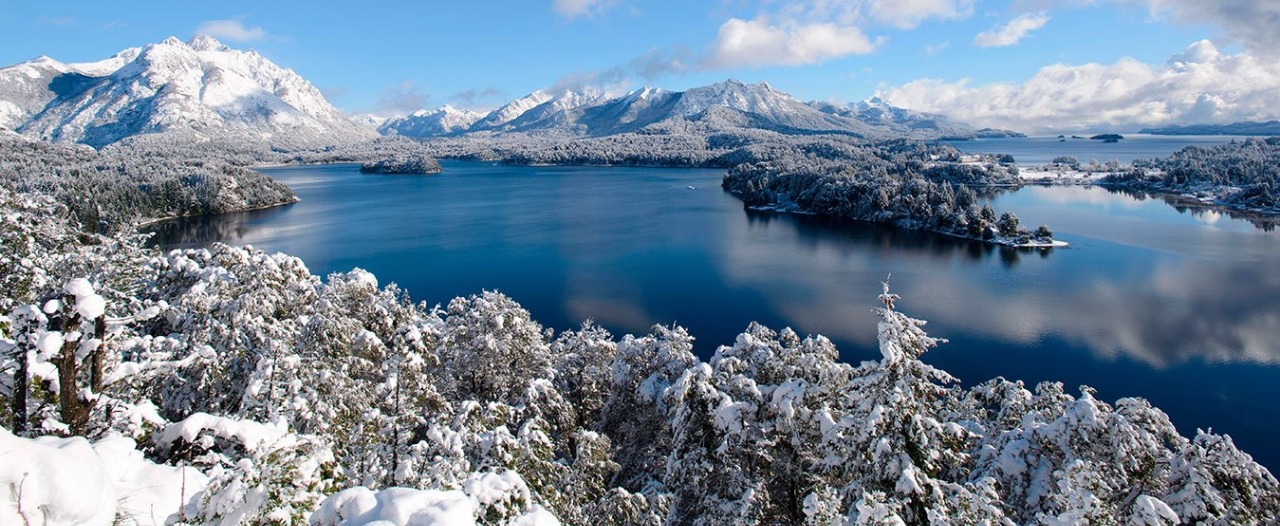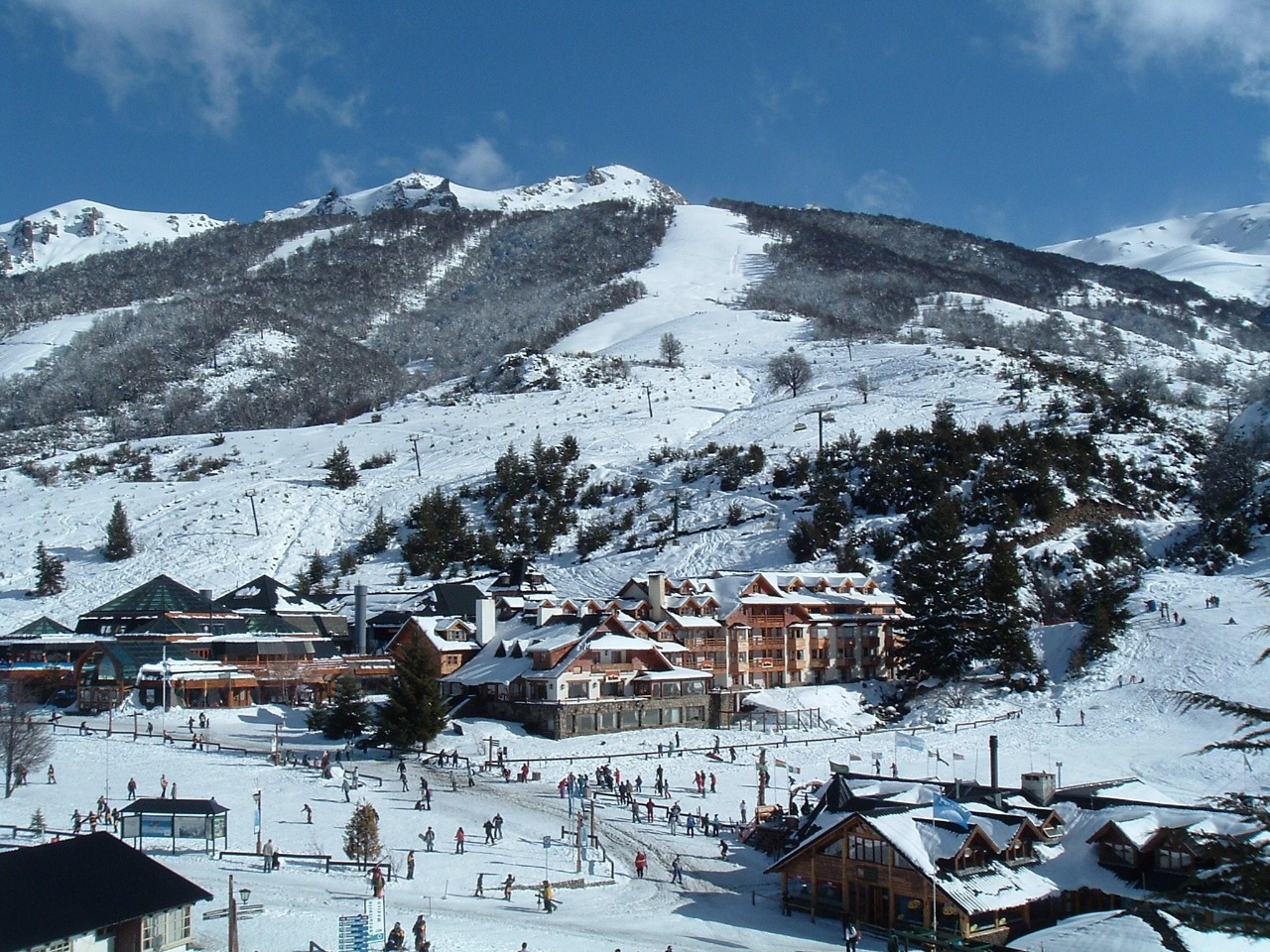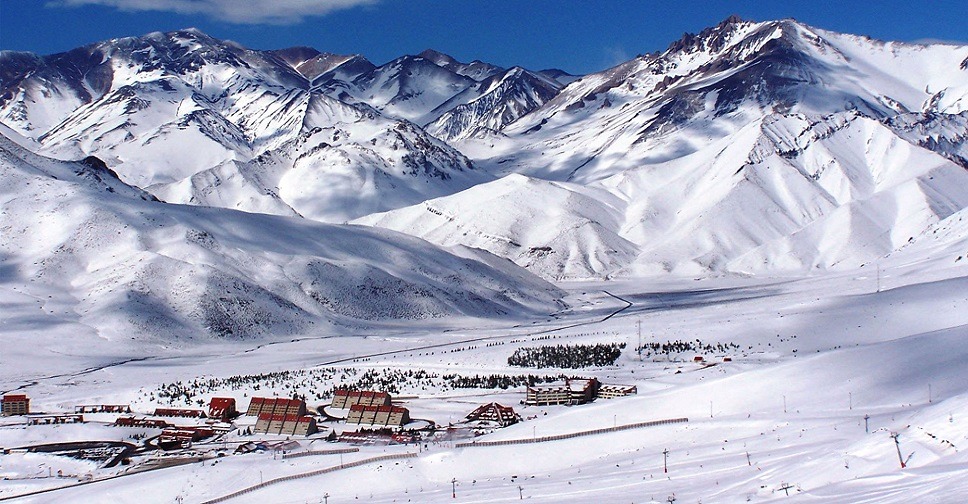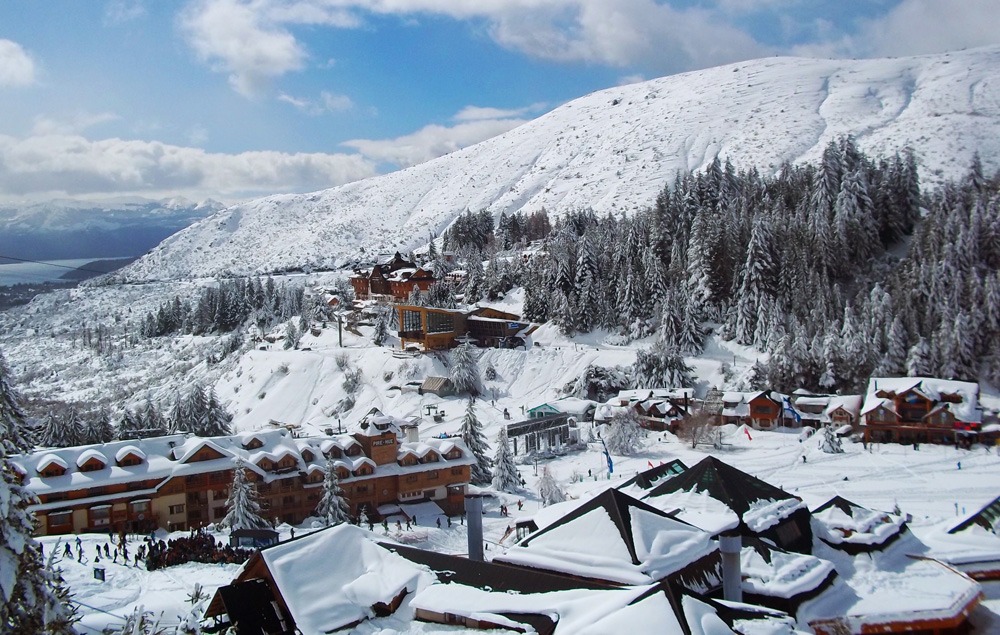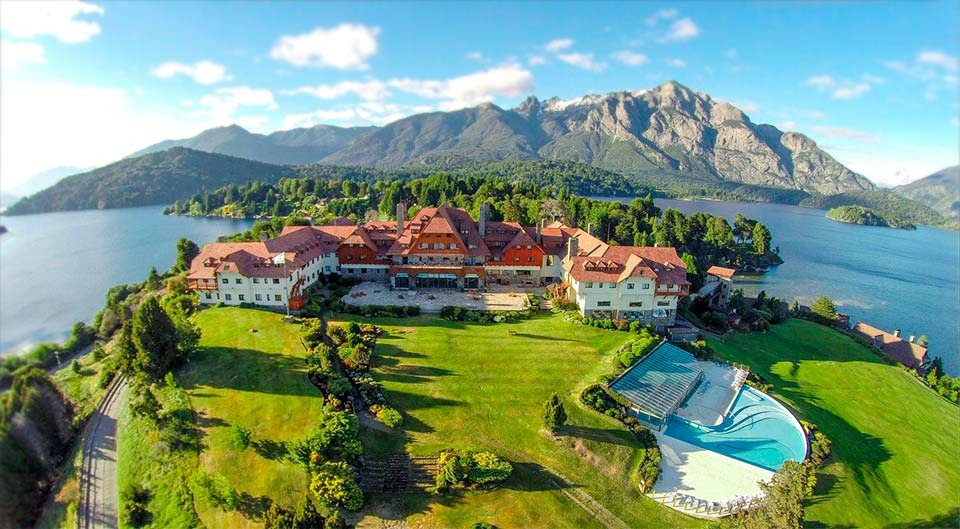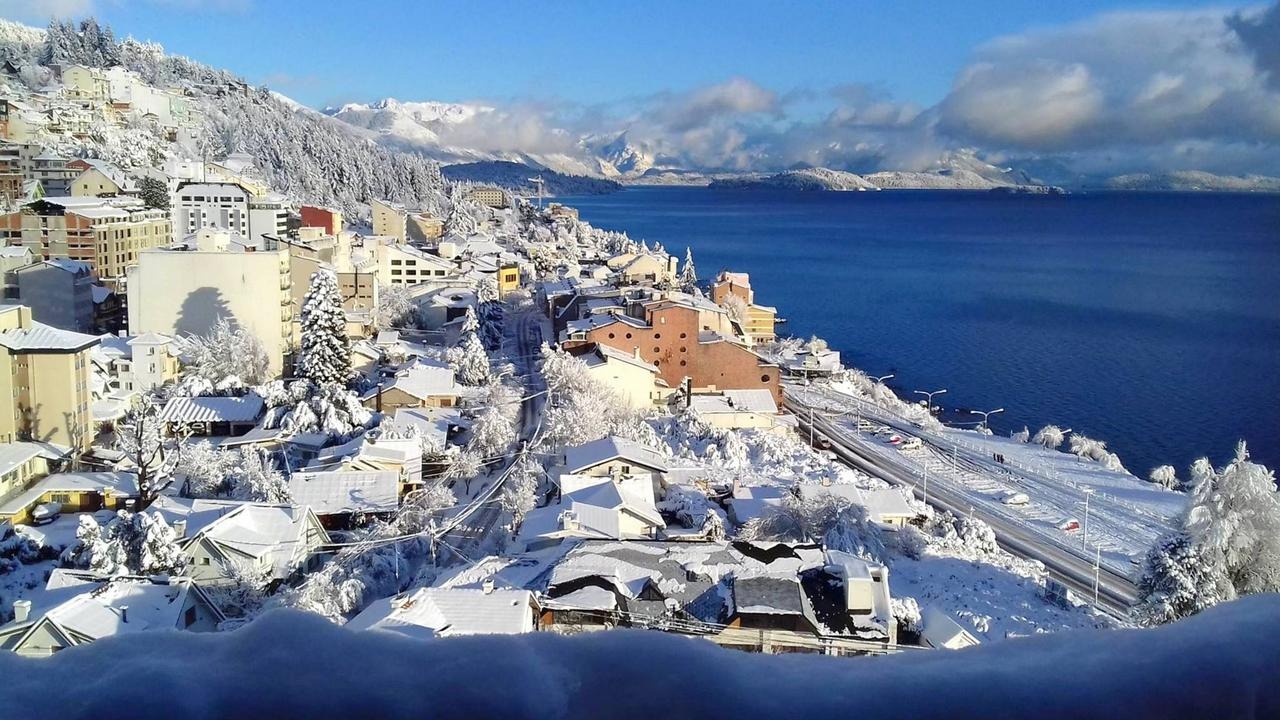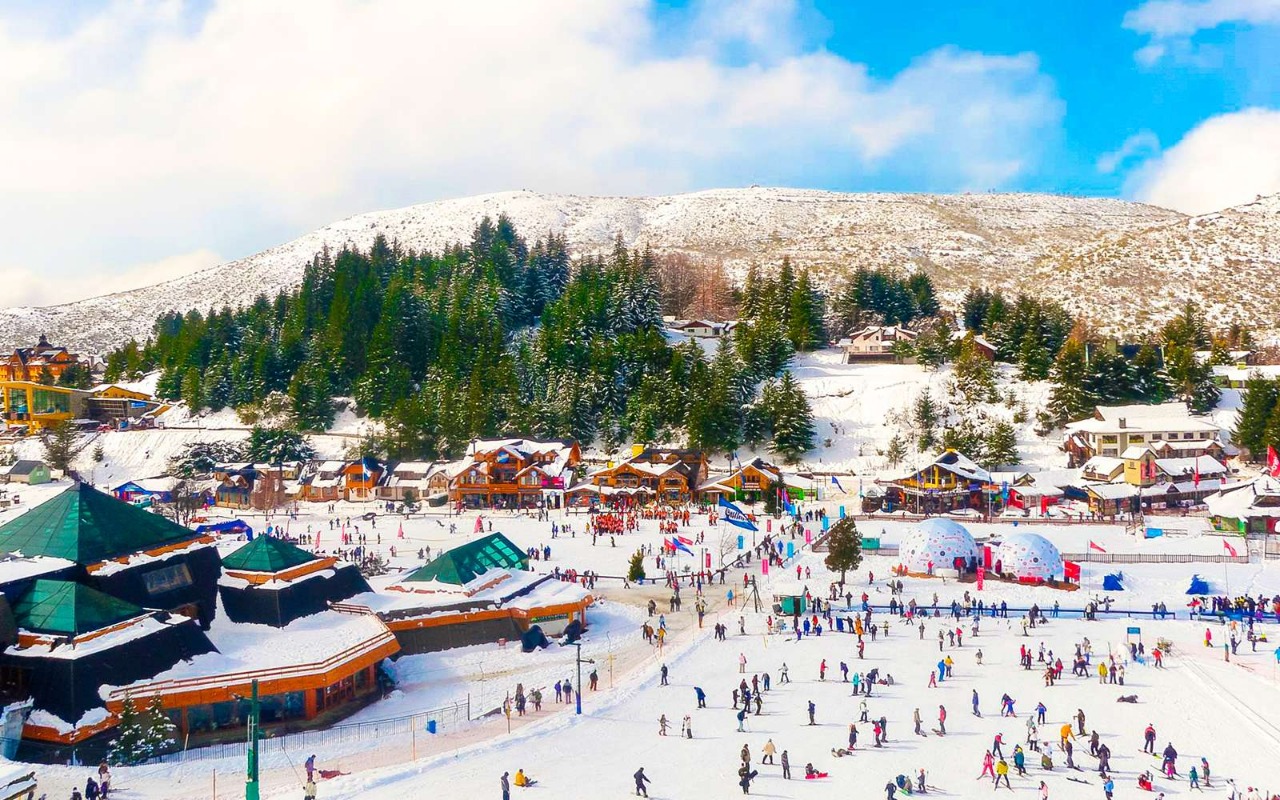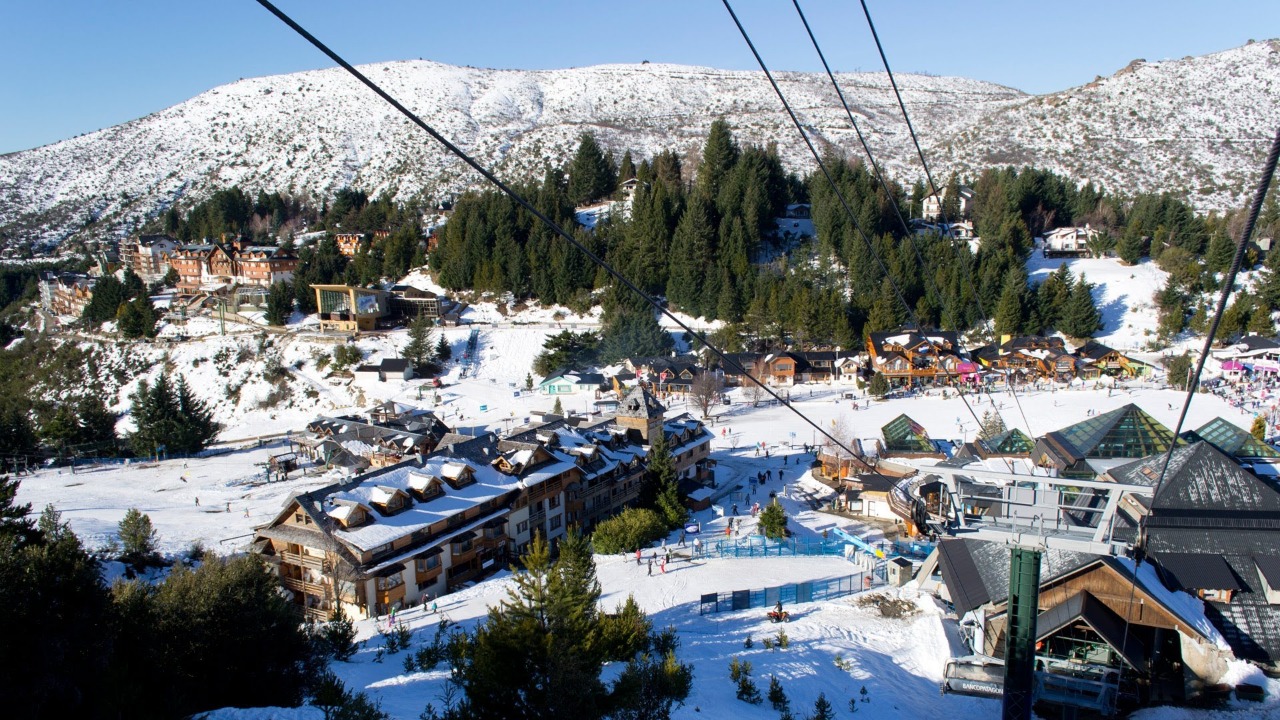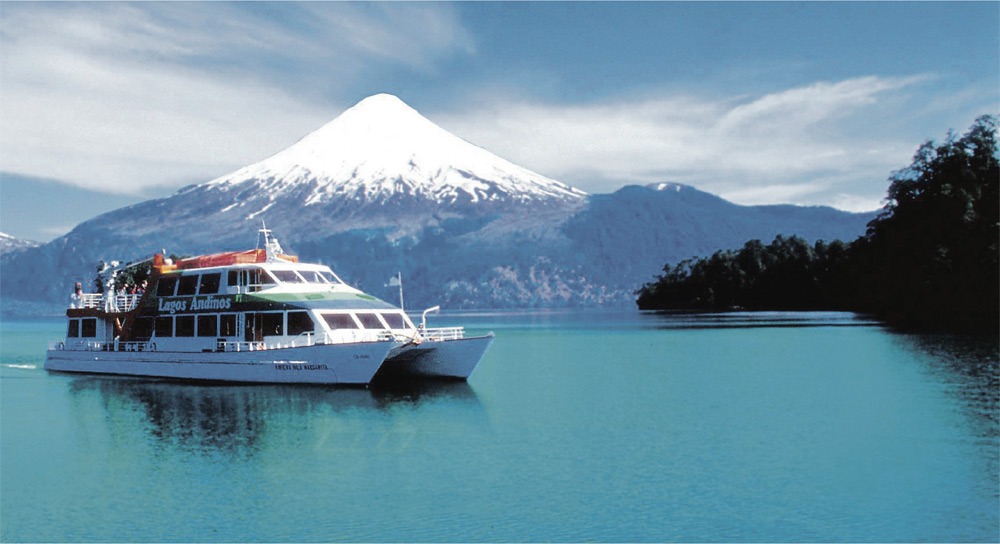Pictures of: Bariloche, Argentina
Location map
Airports
Hotels and other Accommodation
Golf Courses
What to visit
Consulates & Embassies
World Nomads
The Travel Insurance with the largest coverage

The Travel Insurance with the largest coverage

Bariloche
Bariloche, whose official name is San Carlos de Bariloche, is a city of Argentina, located in the Province of Río Negro, near the Andes Mountains on the border with Chile, famous for its European architecture.
It is surrounded by lakes (Nahuel Huapi, Gutiérrez, Mascardi) and mountains, such as Cerro Tronador (3354 m altitude, on the border with Chile), Cerro Catedral (bustling ski resort) and Cerro López.
The name Bariloche comes from the word "Vuriloche", which in the Mapuche language means "people from behind the mountain". This is because its primitive inhabitants, the Mapuche Indians, originated on the other side of the Andes Mountains. The lower altitude of the Andes in the Bariloche region (in some cases, less than 1000 m, covered with forests) allowed the Mapuches to migrate from southern Chile to the Patagonian region of Argentina.
Bariloche, a beautiful city to visit at any time of year, enjoy the natural beauty with friends and family.
It is surrounded by lakes (Nahuel Huapi, Gutiérrez, Mascardi) and mountains, such as Cerro Tronador (3354 m altitude, on the border with Chile), Cerro Catedral (bustling ski resort) and Cerro López.
The name Bariloche comes from the word "Vuriloche", which in the Mapuche language means "people from behind the mountain". This is because its primitive inhabitants, the Mapuche Indians, originated on the other side of the Andes Mountains. The lower altitude of the Andes in the Bariloche region (in some cases, less than 1000 m, covered with forests) allowed the Mapuches to migrate from southern Chile to the Patagonian region of Argentina.
Bariloche, a beautiful city to visit at any time of year, enjoy the natural beauty with friends and family.
Transport
The city has an airport, the International Airport Teniente Luis Candelaria that is equipped to receive jets, and it operates domestic and international flights to neighboring countries.
By road, it is 1638 km south of the Argentine capital, Buenos Aires.
It connects to Chile also by road (about 130 km to the border, and another 115 km to the Chilean city of Osorno), with the option for tourists to cross on alternate routes between boats and buses, in a walk known as Cruce de Lagos, to Puerto Montt.
By road, it is 1638 km south of the Argentine capital, Buenos Aires.
It connects to Chile also by road (about 130 km to the border, and another 115 km to the Chilean city of Osorno), with the option for tourists to cross on alternate routes between boats and buses, in a walk known as Cruce de Lagos, to Puerto Montt.
Weather
In general, Bariloche's climate is cold and dry because it is situated in a climatic micro-zone and of temperate forest vegetation.
Its climate is temperate, influenced by the proximity of the Andes, and its forests are maintained thanks to the abundance of water of the great glacial lakes, like the Nahuel Huapi.
During the summer days, they are warm, allowing all kinds of activities, and the heat can reach thirty degrees. However, this temperature can drop to as low as 15 degrees at night, since another feature of the region's climate is the significant temperature range that can be recorded between day and night temperatures.
The climatic differences during the day, plus the differences of soils and reliefs that have the region, result in a varied and unique flora and fauna.
In winter (June to September), temperatures drop considerably with values ranging from 5º to minus 10º C, and the higher amount of snow in the higher mountains starts the ski season. According to experts, the best snow falls in August.
The wind also influences the thermal sensation. A hot day can become cool depending on the wind.
In areas of higher height, obviously lower temperatures are recorded; this determines that in Cerro Catedral, in the ski center, the temperature is much lower than in the city.
The water in the lakes is always very cold; some of the smaller lakes may freeze during the winter.
Its climate is temperate, influenced by the proximity of the Andes, and its forests are maintained thanks to the abundance of water of the great glacial lakes, like the Nahuel Huapi.
During the summer days, they are warm, allowing all kinds of activities, and the heat can reach thirty degrees. However, this temperature can drop to as low as 15 degrees at night, since another feature of the region's climate is the significant temperature range that can be recorded between day and night temperatures.
The climatic differences during the day, plus the differences of soils and reliefs that have the region, result in a varied and unique flora and fauna.
In winter (June to September), temperatures drop considerably with values ranging from 5º to minus 10º C, and the higher amount of snow in the higher mountains starts the ski season. According to experts, the best snow falls in August.
The wind also influences the thermal sensation. A hot day can become cool depending on the wind.
In areas of higher height, obviously lower temperatures are recorded; this determines that in Cerro Catedral, in the ski center, the temperature is much lower than in the city.
The water in the lakes is always very cold; some of the smaller lakes may freeze during the winter.
Official currency
Argentinian peso
Official language
Spanish
Tourism
Scattered along the shore of Lake Nahuel Huapi, in the middle of the national park of the same name, Bariloche has one of the most beautiful configurations imaginable. This, combined with a wealth of summer and winter activities in the surrounding countryside, has helped to become, for better or worse, the Lake District as the main destination.
The rising peaks of Cerros Catedral, Lopez, Ñireco and Shaihuenque (to name a few), all over 2000m high, attract attention, giving a postcard view in almost every direction.
These mountains are not only to be admired, because with excellent snow coverings (sometimes more than 2m at the end of the season) makes them one of the wonders of winter, and an attraction for skiers and snowboarders.
In the summer naturists take over, exploring the mountains for climbing, hiking trails, trout fishing, mountain bike rides, and horses.
There is so much fun to experience, that this has become the destination for the year-end celebrations of Argentine high school students.
And if all this were not enough, Bariloche is also the chocolate capital of Argentina, and the only thing that comes close to the amount of space in storefronts dedicated to fresh chocolate is the infinite number of peculiar gnomes of all sizes and scallops sold at almost every store in the center.
Bariloche is now known for its alpine architecture, giving a touch of Patagonia through the use of local woods and unique stone construction, as seen in the buildings of the Civic Center of Bustillo.
The rising peaks of Cerros Catedral, Lopez, Ñireco and Shaihuenque (to name a few), all over 2000m high, attract attention, giving a postcard view in almost every direction.
These mountains are not only to be admired, because with excellent snow coverings (sometimes more than 2m at the end of the season) makes them one of the wonders of winter, and an attraction for skiers and snowboarders.
In the summer naturists take over, exploring the mountains for climbing, hiking trails, trout fishing, mountain bike rides, and horses.
There is so much fun to experience, that this has become the destination for the year-end celebrations of Argentine high school students.
And if all this were not enough, Bariloche is also the chocolate capital of Argentina, and the only thing that comes close to the amount of space in storefronts dedicated to fresh chocolate is the infinite number of peculiar gnomes of all sizes and scallops sold at almost every store in the center.
Bariloche is now known for its alpine architecture, giving a touch of Patagonia through the use of local woods and unique stone construction, as seen in the buildings of the Civic Center of Bustillo.
Gastronomy
In Bariloche the gastronomy option is very varied.
The kitchen was able to mix the most representative of European cuisine with the best regional dishes.
Classic recipes get added touches such as the taste of pine mushrooms, fine fruits and all sorts of fruits that make all the revenue a specialty.
Bariloche also offers the tourist a series of bars, snack bars; pasta and pizzas, as well as restaurants serving international and regional cuisine.
Salmon and delicious tasty trout, abundant in the rivers and lakes of Patagonia, can be tasted fresh as well as smoked served with a variety of different sauces.
As for the meat is recommended, the Patagonian lamb which is a local delicacy, along with wild boar and deer, making on the whole attractive dishes.
Also typical of the South region are the products, including salmon, deer and smoked boar, without leaving aside classic dishes such as roast or roasted meat or homemade pasta and pizza.
Patagonia, also presents a profound influence of the indigenous tribes, in particular, those of the mapuches and araucanos.
A typical dish prepared by the latter is the "curanto".
Its preparation process involves digging a 15-cm hole in the ground, inside of which incandescent stones are placed inside a fire. A bed of Nalca or maqui leaves is placed on top of the stones, placing on top the following ingredients: beef, lamb, pork, chicken, sausages (pork sausages), potatoes, sweet potatoes, apples and hollowed squashes stuffed with cheese, cream and peas. Subsequently, all of these ingredients are covered with sheets, and wet fabric pieces are placed on top of them to ensure heat preservation.
Then, everything is covered enough earth, thus transforming the entire operation into a true pressure oven.
To accompany all these magnificent dishes, one can choose between brewed beer, fine wines or champagnes from the region.
Bariloche Chocolates are a classic, both in Argentina and abroad.
Viennese and German cuisine and sweets are also typically associated with this region.
The diversity of red berries grown in the area is eventually transformed into delicious jams and jellies that along with delicious homemade cakes and scones can be enjoyed in traditional tea houses.
The kitchen was able to mix the most representative of European cuisine with the best regional dishes.
Classic recipes get added touches such as the taste of pine mushrooms, fine fruits and all sorts of fruits that make all the revenue a specialty.
Bariloche also offers the tourist a series of bars, snack bars; pasta and pizzas, as well as restaurants serving international and regional cuisine.
Salmon and delicious tasty trout, abundant in the rivers and lakes of Patagonia, can be tasted fresh as well as smoked served with a variety of different sauces.
As for the meat is recommended, the Patagonian lamb which is a local delicacy, along with wild boar and deer, making on the whole attractive dishes.
Also typical of the South region are the products, including salmon, deer and smoked boar, without leaving aside classic dishes such as roast or roasted meat or homemade pasta and pizza.
Patagonia, also presents a profound influence of the indigenous tribes, in particular, those of the mapuches and araucanos.
A typical dish prepared by the latter is the "curanto".
Its preparation process involves digging a 15-cm hole in the ground, inside of which incandescent stones are placed inside a fire. A bed of Nalca or maqui leaves is placed on top of the stones, placing on top the following ingredients: beef, lamb, pork, chicken, sausages (pork sausages), potatoes, sweet potatoes, apples and hollowed squashes stuffed with cheese, cream and peas. Subsequently, all of these ingredients are covered with sheets, and wet fabric pieces are placed on top of them to ensure heat preservation.
Then, everything is covered enough earth, thus transforming the entire operation into a true pressure oven.
To accompany all these magnificent dishes, one can choose between brewed beer, fine wines or champagnes from the region.
Bariloche Chocolates are a classic, both in Argentina and abroad.
Viennese and German cuisine and sweets are also typically associated with this region.
The diversity of red berries grown in the area is eventually transformed into delicious jams and jellies that along with delicious homemade cakes and scones can be enjoyed in traditional tea houses.
Documentation required
TOURISTS
If the stay does not exceed 3 months, it is not necessary to request the tourist visa, but must have a passport with a validity of at least 6 months.
Requests for an extension of residence, as well as a request for a change of immigration category or subcategory, must be made within SIXTY (60) days before the expiration of temporary residence and within 10 (ten) days before the expiration of the transitional residence.
The foreigner who presents himself spontaneously and voluntarily within thirty (30) days of expiration of the deadlines set forth in the previous point, shall be fined FIFTY PERCENT (50%) of the amount of the rate for extension of residence or change category or subcategory.
Requirements:
• Valid passport or valid identity card (neighboring countries).
• Mercosur renewal rate *
• Temporary residency in force *
* In the case where the validity of the visa has expired, it can not be extended such residence, in order to leave the country should apply for an exit permit
EXIT AUTHORIZATION: It can be obtained in the "Dirección Nacional de Migraciones" from 8 am to 8 pm, building 4 "Dirección General de Movimiento Migratorio", or in the delegations of the interior country, or at border posts authorized by DNM.v
IMPORTANT: It has a validity of 10 (ten) days from the date of issuance of the authorization, during that period, you must leave the country, if it expires, it will be necessary to request a new EXIT AUTHORIZATION and pay again.
Requirements:
Valid passport, identity card or National Identity Document valid in your country of origin (the latter with the countries of Brazil, Bolivia, Uruguay, Paraguay, Chile, Peru, Venezuela, Ecuador and Colombia).
If the stay does not exceed 3 months, it is not necessary to request the tourist visa, but must have a passport with a validity of at least 6 months.
Requests for an extension of residence, as well as a request for a change of immigration category or subcategory, must be made within SIXTY (60) days before the expiration of temporary residence and within 10 (ten) days before the expiration of the transitional residence.
The foreigner who presents himself spontaneously and voluntarily within thirty (30) days of expiration of the deadlines set forth in the previous point, shall be fined FIFTY PERCENT (50%) of the amount of the rate for extension of residence or change category or subcategory.
Requirements:
• Valid passport or valid identity card (neighboring countries).
• Mercosur renewal rate *
• Temporary residency in force *
* In the case where the validity of the visa has expired, it can not be extended such residence, in order to leave the country should apply for an exit permit
EXIT AUTHORIZATION: It can be obtained in the "Dirección Nacional de Migraciones" from 8 am to 8 pm, building 4 "Dirección General de Movimiento Migratorio", or in the delegations of the interior country, or at border posts authorized by DNM.v
IMPORTANT: It has a validity of 10 (ten) days from the date of issuance of the authorization, during that period, you must leave the country, if it expires, it will be necessary to request a new EXIT AUTHORIZATION and pay again.
Requirements:
Valid passport, identity card or National Identity Document valid in your country of origin (the latter with the countries of Brazil, Bolivia, Uruguay, Paraguay, Chile, Peru, Venezuela, Ecuador and Colombia).
Health care
For Bariloche, the same health care should be taken for the whole country.
For those who decide to visit areas where dengue is endemic (provinces of northern Argentina), it is recommended to use repellent substances and light clothing that covers the skin, as well as being aware of the first symptoms of the disease - high fevers, pains headaches, muscle or joint pain, skin rash, nausea, or severe tiredness.
The risks of disease spreading decline with temperatures.
No vaccination certificate is required except cholera and yellow fever for passengers from countries where those diseases are endemic.
For those who decide to visit areas where dengue is endemic (provinces of northern Argentina), it is recommended to use repellent substances and light clothing that covers the skin, as well as being aware of the first symptoms of the disease - high fevers, pains headaches, muscle or joint pain, skin rash, nausea, or severe tiredness.
The risks of disease spreading decline with temperatures.
No vaccination certificate is required except cholera and yellow fever for passengers from countries where those diseases are endemic.
Communications
The communications in Bariloche are excellent. There are several mobile phone service companies.
There are loads of Internet cafes in Bariloche, whose internet usage costs are very, very cheap, less than a dollar an hour.
There are loads of Internet cafes in Bariloche, whose internet usage costs are very, very cheap, less than a dollar an hour.
Other tourist destinations in:
Argentina
Argentina
Other world tourist destinations
Why to book with CLUBE TRAVEL
The best prices
Our partnerships with the world´s largest operators offer research on the best market prices.
More options
At Rotas Turisticos you can book the hotel, buy the air ticket, book the transfer from the airport to the hotel and vice versa, book the local excursions, rent the car, take travel insurance and consult the places to visit and where to go.
Holiday Tips & Destinations
Hundreds of holiday destinations with all the options that allow you to easily choose the destination that best suits your dream vacation.
CLUBE TRAVEL
Links

